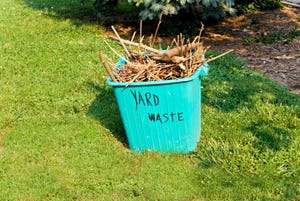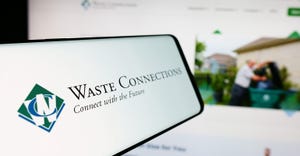World Wildlife Fund Releases Third Installment in ReSource: Plastic Reporting Series
This week, the World Wildlife Fund (WWF) released its annual ReSource: Plastic progress report titled, “Transparent 2022.” This is the third such report WWF has prepared since launching ReSource: Plastic in 2019.

The World Wildlife Fund (WWF) released its annual ReSource: Plastic progress report titled, “Transparent 2022.”
This is the third such report WWF has prepared since launching ReSource: Plastic in 2019 with the purpose of “closing the ‘how’ gap” in enabling some of the world’s largest brands to tackle the plastic waste crisis. The project seeks to equip companies with “the latest data and insights they need to take actions that maximize the potential for impact,” and—through a measurement framework—help these companies “translate their ambitious commitments into meaningful, measurable progress.”
Transparent 2022 showcases how Resource: Plastic’s legacy and member companies have made progress in the past year. These companies include Keurig Dr Pepper, Procter & Gamble, McDonald’s, Starbucks, The Coca-Cola Company, Amcor, Colgate-Palmolive, and Kimberly-Clark. The report also establishes a baseline footprint for ReSource’s newest Principal Member, CVS Health.
WWF believes that businesses are “uniquely positioned” to reduce waste within their own supply chains through better sourcing, improved design, and business model innovation. Corporations “can also serve as points of influence and catalysts for action among other stakeholders, including governments and the public.” And, based on its analysis using data from UNEP, Trucost, and the Plastic Disclosure Project, WWF estimates that as few as 100 companies have the potential to prevent roughly 50 million metric tons of the world’s plastic waste by 2030.
ReSource’s approach to systems change is centered on the following priorities: eliminating unnecessary plastic, doubling global recycling and composting, shifting to sustainable inputs for remaining plastic, and improving data harmonization. Its measurement framework tracks corporate actions in these areas.
Highlights from the aggregated results reported in this year’s publication include:
The average use of recycled content across the aggregate portfolio has increased to 10.2% in 2021 from 8.0% in 2020
Problematic plastics (small plastics, PS, and PVC) account for 1.3% of the aggregate portfolio, a slight decrease since 2020
Based on WWF’s waste management model, 34% of ReSource members’ plastic footprint is estimated to be recycled, 9% incinerated, 43% landfilled, and 15% mismanaged
The report acknowledges that, since ReSource adds new members each year, “annual changes in the aggregate portfolio are generally influenced more by the addition of these companies’ portfolios than by changes in the portfolios of existing members,” making it difficult to track progress over time. It then digs into individual member progress data, providing company-specific goals and insights.
For instance, the section on Colgate-Palmolive notes that, as of year-end 2021, Colgate-Palmolive has eliminated using PVC in 99.9% of packaging by weight and has developed plans to exit the remaining uses where there is a technical challenge related to product safety. “The company has also continued to reduce the use of plastic and reduced the weight of their toothpaste tubes in Thailand by up to 16% in 2021” through optimized design. Also, in order to increase the recyclability of its portfolio, the company “increased the percentage of clear PET plastic bottles from 94% in 2020 to 98% in 2021.” It has also increased the percentage of its toothpaste tubes that are recognized as recyclable by The Association of Plastic Recyclers or Plastics Recyclers Europe from 1% to 7% between 2020 and 2021, with continued room for improvement.
As for Keurig Dr Pepper, it made progress against its goal to convert 100% of its entire packaging portfolio to be recyclable or compostable, “primarily through design improvements that replaced problematic labels on select PET bottles.” Progress toward the company’s goal of 25% PCR plastic content in packaging by 2025 was primarily the result of completing the transition of several beverages’ bottles to 100% rPET plastic. The report notes that this reduced the need to use approximately 57 million pounds of virgin plastic in 2021. The company has also partnered with packaging manufacturer PAPACKS to accelerate development of its first fully recyclable and/or compostable paper bottle.
In its recommendations for continued action, the report highlights ongoing challenges and new opportunities. It mentions several reuse-based pilot programs undertaken by members in 2021, including The Coca-Cola Company’s collaboration with Loop for reusable packaging, CVS Health’s pilot of a reusable bag rental system in California, and Starbucks’ Borrow-A-Cup and Cup-Share programs in several markets. “Collective action efforts on reuse continue to create alignment on definitions and measurement,” the authors note—and such packaging “remains a key opportunity for members, especially as it begins to scale in availability.”
The report also suggests that responsibly sourced biobased plastic “has a role to play in applications where there is not currently a clear path to be able to use recycled content. It will also be critical in instances when the properties of a novel biobased plastic are advantageous—for example, when a pack would not be able to be recycled because of product contamination but could be composted.”
And, importantly, the authors note that, “the availability of recycled materials does not match the demand set by companies to meet their sustainability goals.” Increasing availability of recycled content is, thus, “a key intervention.” Additional recommendations include collective action on composting system advancement and the creation of consistent, standardized reporting for plastics-related disclosures.
WWF also acknowledges that public policy will be critical to enabling and accelerating the transition to circularity. There are, it asserts, “unprecedented opportunities to advance circularity policy solutions, and we need companies to advocate for them.”
WWF aims to engage 100+ companies through its ReSource Footprint Tracker by 2030, and reach the ultimate goal of “preventing at least 50 million metric tons of plastic waste from entering nature.”
About the Author
You May Also Like




